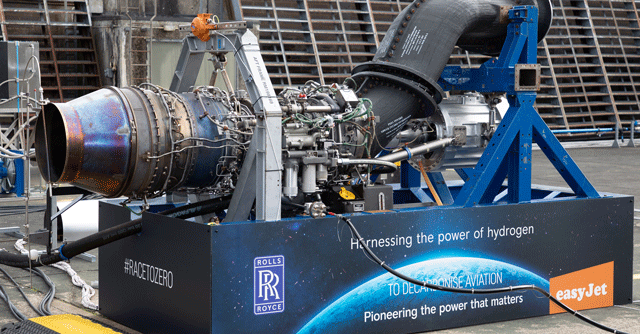
Rolls Royce, EasyJet test aircraft engine running on hydrogen


Rolls-Royce and airline company EasyJet have conducted a ground test of an aircraft engine that uses hydrogen as fuel. Rolls-Royce, which also makes engines for the airline industry, claims this is the world's first test of an aircraft engine running on hydrogen.
The two companies have started planning a second round of ground tests and are aiming to use it for flight tests in the future, the carmaker said in a blog post.
Rolls-Royce claims the test demonstrates the efficacy of hydrogen as a “zero carbon aviation fuel” for the future.

The test was conducted at an outdoor test facility at Boscombe Down in the UK. A modified Rolls-Royce AE 2100-A regional aircraft engine was used for the tests while the hydrogen fuel, generated through wind and tidal energy, was provided by European Marine Energy Centre (EMEC).
“We are pushing the boundaries to discover the zero carbon possibilities of hydrogen, which could help reshape the future of flight,” said Grazia Vittadini, chief technology officer of Rolls-Royce.
Rolls-Royce and EasyJet announced their partnership in July as part of their commitment to achieving net zero carbon emissions by 2050.

“We are committed to continuing to support this ground-breaking research because hydrogen offers great possibilities for a range of aircraft, including EasyJet-sized aircraft. That will be a huge step forward in meeting the challenge of net zero by 2050,” said Johan Lundgren, chief executive of EasyJet.
According to an International Energy Agency (IEA) report, published in September, the aviation sector accounted for over 2% of global energy-related CO2 emissions in 2021, despite the Covid-led disruption in 2020.
Though airline companies have developed new engines and aircraft that are more fuel efficient, IEA claims improvements are lower than what is required to achieve net zero emission.

The aviation industry is targeting net zero carbon emissions by 2050, the industry body International Air Transport Association (IATA) said in October 2021.
According to a March 2020 study by BloombergNEF, hydrogen can cut up to 34% of global greenhouse gas emissions by 2050.
